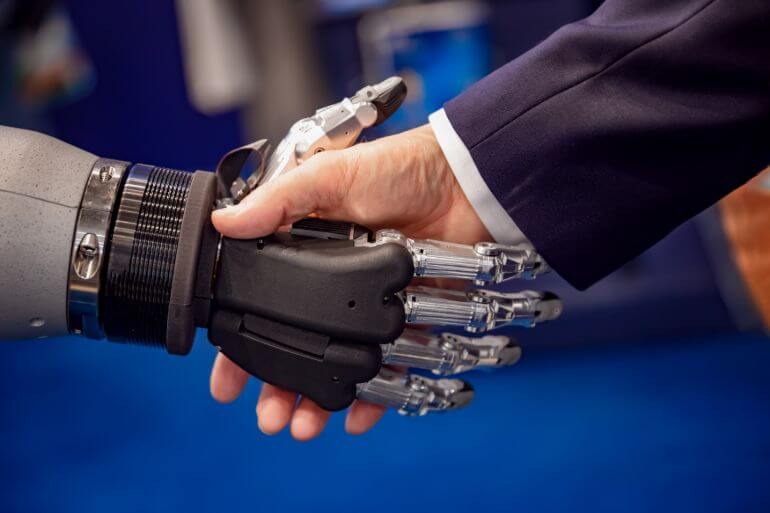In 2020, COVID-19, together with technology, has accelerated automation at a pace never seen before. The future of work is reinventing itself and will continue to do so for the next decade. This has shown that only one thing is certain: as we enter the new normal, digital will be key to economic recovery(McKinsey & Company).
What is automation?
According to Wikipedia, automation is "the technology by which a process or procedure is performed with minimal human assistance". Companies are increasingly investing in automation and robotics to streamline processes and become competitive, not only to save time and money, but also to comply with social distancing, as well as to anticipate changes in demand and identify weaknesses in each area. In addition, the move to the internet of things and digitalisation is empowering companies, which are creating innovative business models and ultimately opportunities.
How to be prepared for an automated future: 5 tips
Want to enter the automated future but don't know how? Here are 5 tips that can help your management be better prepared for the digital world of the future.
1) Encourage continuous learning and skills upgrading: motivating employees to acquire new skills is essential, not only to improve their jobs and careers, but also to address the apparent skills shortage that exists in various sectors.
2) Giving way to unconventional intermediaries: User-friendly interfaces that connect users with intelligent machines are growing rapidly. As a result, user experience is increasingly relevant, as is design and testing.
3) Encourage co-creation: although the future belongs to technology, non-technologists will still have a place in an automated future. Co-creation by technology and business is an important element in the work of organisations; delivering better products and services to users and ultimately providing a better user experience.
4) Differentiate yourself as a brand that stands out: Today, both companies and employees need to rebuild their personal brand to showcase inspiring, influential and quality profiles to secure access to today's job market while remaining competitive.
5) Value the human touch: Many jobs are starting to require other types of skills. Soft skills, such as creativity, communication, empathy and strategic thinking, are a good example of human skills that AI cannot yet compete with.
To put these tips into practice, it is important to prepare the way well and, after implementing them, to regularly monitor the progress made in order to achieve the goals set in each area.

Automation: job losses, inequality... but also limitless opportunities
Automation and artificial intelligence will undoubtedly transform and help businesses around the world increase their productivity in 2020 and beyond in what is known as the Fourth Industrial Revolution, an era in which the merging of technologies continues to blur the boundaries between the physical and digital worlds.
Digital technologies are shaping a new era
However, as in previous industrial revolutions (i.e. the First Industrial Revolution of 1765 driven by the invention of the steam engine, the Second Industrial Revolution of 1870 driven by electricity and the Third Industrial Revolution of 1969 driven by nuclear power and computing), as well as enabling new standards of efficiency and innovation in business, the Fourth Industrial Revolution is also contributing to a more unequal world.
Now, while it is true that the increasing use of new technologies will be associated with job losses (many jobs will be automated with robots that will not only perform tasks better and more efficiently, but also prevent safety hazards), we must also bear in mind that it will create new jobs that do not exist today, just as new technologies did in the past. In short, technology is not the direct cause of job losses, but it is undeniable that it is increasing inequality, as access to it is increasingly polarised.
Towards a resilient future
There is no turning back. The workplace will change dramatically in the coming decades due to the growing need to improve efficiency and sustainability. The question is: how will companies and, more importantly, management teams respond?
The solution is simple: we will soon live in a collaborative and resilient future where automation and AI will optimise the work of the most talented employees. Humans will have to learn to coexist and help each other in a very different work context, alongside robots and AI, a scenario in which human-machine collaboration will be crucial. Focusing on human strengths, i.e. skills such as creativity, critical thinking and emotional intelligence, will be a safe bet.
Therefore, it all comes down to reinventing today's workforce. The skills needed today are changing fast, so companies must have up-to-date strategies in place to ensure that they can always find people with the right skills when they need them, and run successful on-boarding processes. They are also shifting to a hybrid workforce model in which the entire organisation shares ownership of labour decisions along with management.
Easily automate your company's HR processes with niikiis
We realise that automating business processes while organising yourself to pursue success can be a major challenge, especially in 2020. niikiis is an innovative HRIS software solution that helps organisations digitise and automate repetitive tasks and processes effortlessly to build a people-centric workplace. Request a demo with our product experts and find out first-hand how our solution can meet your business needs today.


 Employee database
Employee database  Documents and e-signature
Documents and e-signature  Reporting and analytics
Reporting and analytics  Payroll and incidents
Payroll and incidents  Time and Attendance Software
Time and Attendance Software  Shifts and task list
Shifts and task list  Absences & time-off
Absences & time-off  Workflows
Workflows  Expense management
Expense management  Recruitment and selection software
Recruitment and selection software  Onboarding
Onboarding  Training and procedures
Training and procedures  Internal communication
Internal communication  Performance assessment software
Performance assessment software  HR surveys and forms
HR surveys and forms  Chatbot
Chatbot 